cypress公司的MB9B520M是高度集成的32位MCU,基于Arm? Cortex?-M3處理器,工作頻率高達72MHz,集成了片上閃存和SRAM,以及外設功能如各種計時器,ADC,DAC和通信接口如USB, CAN, UART, CSIO, I2C, LIN,主要用在嵌入式應用和低成本低功耗應用.本文介紹了MB9B520M主要特性,框圖以及評估板SK-FM3-80PMC-MB9BF524M主要特性,電路圖和主要元件分布圖.
The MB9B520M Series are highly integrated 32-bit microcontrollers dedicated for embedded controllers with low-power consumption mode and competitive cost.
These series are based on the Arm? Cortex?-M3 Processor with on-chip Flash memory and SRAM, and have peripheral functions such as various timers, ADCs, DACs and Communication Interfaces (USB, CAN, UART, CSIO, I2C, LIN).
The products which are described in this data sheet are placed into TYPE9 product categories in “FM3 Family Peripheral Manual”.
MB9B520M主要特性:
32-bit Arm? Cortex?-M3 Core
?Processor version: r2p1
?Up to 72 MHz frequency Operation
?Integrated Nested Vectored Interrupt Controller (NVIC): 1
NMI(non-maskable interrupt) and 48 peripheral interruptsand 16 priority levels
?24-bit System timer (Sys Tick): System timer for OS taskmanagement
On-chip Memories
[Flash memory]
? Dual operation Flash memory
? Dual Operation Flash memory has the upper bank and thelower bank.
So,this series could implement erase, write and readoperations for each bank simultaneously.
?Main area: Up to 256 Kbytes (Up to 240 Kbytes upper bank+ 16 Kbytes lower bank)
?Work area: 32 Kbytes (lower bank)
?Read cycle: 0 wait-cycle
?Security function for code protection
[SRAM]
This Series on-chip SRAM is composed of two independent
SRAM (SRAM0, SRAM1). SRAM0 is connected to I-code busand D-code bus of Cortex-M3 core. SRAM1 is connected toSystem bus.
?SRAM0: Up to 16 Kbytes
?SRAM1: Up to 16 Kbytes
USB Interface
The USB interface is composed of Device and Host.
PLL for USB is built-in, USB clock can be generated bymultiplication of Main clock.
[USB device]
?USB2.0 Full-Speed supported
?Max 6 EndPoint supported
? EndPoint 0 is control transfer
? EndPoint 1, 2 can select Bulk-transfer, Interrupt-transfer orIsochronous-transfer
? EndPoint 3 to 5 can select Bulk-transfer orInterrupt-transfer
? EndPoint 1 to 5 are comprised of Double Buffers.
? The size of each endpoint is according to the follows.
? Endpoint 0, 2 to 5: 64 bytes
? Endpoint 1: 256 bytes
[USB host]
?USB2.0 Full/Low-speed supported
?Bulk-transfer, interrupt-transfer and Isochronous-transfersupport
?USB Device connected/dis-connected automatic detection
?Automatic processing of the IN/OUT token handshakepacket
?Max 256-byte packet-length supported
?Wake-up function supported
CAN Interface
?Compatible with CAN Specification 2.0A/B
?Maximum transfer rate: 1 Mbps
?Built-in 32 message buffer
Multi-function Serial Interface (Max eight channels)
?4 channels with 16 steps×9-bit FIFO (ch.0/1/3/4), 4 channelswithout FIFO (ch.2/5/6/7)
?Operation mode is selectable from the followings for eachchannel.
? UART
? CSIO
? LIN
? I2C
[UART]
? Full duplex double buffer
? Selection with or without parity supported
? Built-in dedicated baud rate generator
? External clock available as a serial clock
? Hardware Flow control: Automatically control thetransmission/reception by CTS/RTS (only ch.4)
? Various error detection functions available (parity errors,framing errors, and overrun errors)
[CSIO]
? Full duplex double buffer
? Built-in dedicated baud rate generator
? Overrun error detection function available
[LIN]
? LIN protocol Rev.2.1 supported
? Full duplex double buffer
? Master/Slave mode supported
? LIN break field generation (can be changed to 13 to 16-bitlength)
? LIN break delimiter generation (can be changed to 1 to 4-bitlength)
? Various error detection functions available (parity errors,framing errors, and overrun errors)
[I2C]
Standard mode (Max 100 kbps) / Fast mode (Max 400 kbps)supported
DMA Controller (Eight channels)
The DMA Controller has an independent bus from the CPU, soCPU and DMA Controller can process simultaneously.
? 8 independently configured and operated channels
? Transfer can be started by software or request from thebuilt-in peripherals
? Transfer address area: 32-bit (4 Gbytes)
? Transfer mode: Block transfer/Burst transfer/Demandtransfer
? Transfer data type: byte/half-word/word
? Transfer block count: 1 to 16
? Number of transfers: 1 to 65536
A/D Converter (Max 26 channels)
[12-bit A/D Converter]
? Successive Approximation type
? Built-in 2 units
? Conversion time: 0.8 μs @ 5 V
? Priority conversion available (priority at 2 levels)
? Scanning conversion mode
? Built-in FIFO for conversion data storage (for SCANconversion: 16 steps, for Priority conversion:4 steps)
D/A Converter (Max two channels)
? R-2R type
? 10-bit resolution
Base Timer (Max eight channels)
Operation mode is selectable from the followings for eachchannel.
? 16-bit PWM timer
? 16-bit PPG timer
? 16-/32-bit reload timer
? 16-/32-bit PWC timer
General-Purpose I/O Port
This series can use its pins as general-purpose I/O ports whenthey are not used for peripherals. Moreover, the port relocatefunction is built in. It can set which I/O port the peripheralfunction can be allocated to.
? Capable of pull-up control per pin
? Capable of reading pin level directly
? Built-in the port relocate function
? Up to 65 high-speed general-purpose I/O Ports@80pinPackage
? Some ports are 5V tolerant.
? See “List of Pin Functions” and “I/O Circuit Type” to confirmthe corresponding pins.
Dual Timer (32-/16-bit Down Counter)
The Dual Timer consists of two programmable 32-/16-bit downcounters.
Operation mode is selectable from the followings for eachchannel.
? Free-running
? Periodic (=Reload)
? One-shot
Quadrature Position/Revolution Counter (QPRC)(Max two channels)
The Quadrature Position/Revolution Counter (QPRC) is usedto measure the position of the position encoder. Moreover, it ispossible to use as the up/down counter.
? The detection edge of the three external event input pins AIN,BIN and ZIN is configurable.
? 16-bit position counter
? 16-bit revolution counter
? Two 16-bit compare registers
Multi-function Timer
The Multi-function timer is composed of the following blocks.
? 16-bit free-run timer × 3 ch./unit
? Input capture × 4 ch./unit
? Output compare × 6 ch./unit
? A/D activation compare × 2 ch./unit
? Waveform generator × 3 ch./unit
? 16-bit PPG timer × 3 ch./unit
The following function can be used to achieve the motorcontrol.
? PWM signal output function
? DC chopper waveform output function
? Dead time function
? Input capture function
? A/D convertor activate function
? DTIF (Motor emergency stop) interrupt function
Real-time clock (RTC)
The Real-time clock can countYear/Month/Day/Hour/Minute/Second/A day of the week from00 to 99.
? The interrupt function with specifying date and time
(Year/Month/Day/Hour/Minute) is available. This function isalso available by specifying only Year, Month, Day, Hour orMinute.
? Timer interrupt function after set time or each set time.
? Capable of rewriting the time with continuing the time count.
? Leap year automatic count is available.
Watch Counter
The Watch counter is used for wake up from Sleep and Timermode.
Interval timer: up to 64 s (Max) @ Sub Clock: 32.768 kHz
External Interrupt Controller Unit
? Up to 23 external interrupt input pins @ 80 pin Package
? Include one non-maskable interrupt (NMI) input pin
Watchdog Timer (Two channels)
A watchdog timer can generate interrupts or a reset when atime-out value is reached.
This series consists of two different watchdogs, a "Hardware"watchdog and a "Software" watchdog.
The "Hardware" watchdog timer is clocked by the built-inLow-speed CR oscillator. Therefore, the "Hardware" watchdogis active in any low-power consumption modes except RTC,Stop, Deep Standby RTC, Deep Standby Stop modes.
CRC (Cyclic Redundancy Check) Accelerator
The CRC accelerator calculates the CRC which has a heavysoftware processing load, and achieves a reduction of theintegrity check processing load for reception data and storage.
CCITT CRC16 and IEEE-802.3 CRC32 are supported.
? CCITT CRC16 Generator Polynomial: 0x1021
? IEEE-802.3 CRC32 Generator Polynomial: 0x04C11DB7
Clock and Reset
[Clocks]
Selectable from five clock sources (2 external oscillators, 2built-in CR oscillators, and Main PLL).
? Main Clock: 4 MHz to 48 MHz
? Sub Clock: 32.768 kHz
? Built-in High-speed CR Clock: 4 MHz
? Built-in Low-speed CR Clock: 100 kHz
? Main PLL Clock
[Resets]
? Reset requests from INITX pin
? Power-on reset
? Software reset
? Watchdog timers reset
? Low-voltage detection reset
? Clock Super Visor reset
Clock Super Visor (CSV)
Clocks generated by built-in CR oscillators are used tosupervise abnormality of the external clocks.
? If external clock failure (clock stop) is detected, reset isasserted.
? If external frequency anomaly is detected, interrupt or reset isasserted.
Low-Voltage Detector (LVD)
This Series includes 2-stage monitoring of voltage on the VCCpins. When the voltage falls below the voltage that has beenset, Low-Voltage Detector generates an interrupt or reset.
? LVD1: error reporting via interrupt
? LVD2: auto-reset operation
Low-Power Consumption Mode
Six low-power consumption modes supported.
? Sleep
? Timer
? RTC
? Stop
? Deep Standby RTC (selectable between keeping the value ofRAM and not)
? Deep Standby Stop (selectable between keeping the value ofRAM and not)
Debug
Serial Wire JTAG Debug Port (SWJ-DP)
Unique ID
Unique value of the device (41 bits) is set.
Power Supply
Wide range voltage:
VCC = 2.7 V to 5.5 V
USBVCC = 3.0 V to 3.6 V (when USB is used)
= 2.7 V to 5.5 V (when GPIO is used)
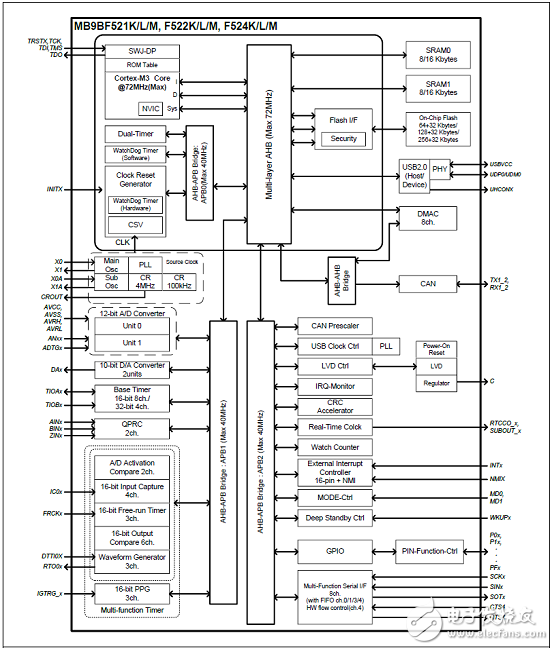
圖1.MB9B520M框圖
評估板SK-FM3-80PMC-MB9BF524M
Supports CY9B120M, CY9B320M and CY9B520M Series
The SK-FM3-80PMC-MB9BF524M includes a low-cost evaluation board based on the Spansion FM3 microcontroller MB9B520M Series.
SK-FM3-80PMC-9BF524M-JL includes a low-cost evaluation board based on the Spansion FM3 microcontroller MB9B520M Series and the JTAG adapter J-Link
評估板SK-FM3-80PMC-MB9BF524M主要特性:
Features of the SK-FM3-80PMC-MB9BF524M board: Microcontroller MB9BF524M
1x UART-Transceiver (SUB-D9 connector)
1x USB to serial converter (Type-B connector)
1x High-speed CAN-Transceiver (SUB-D9 connector)
1x USB-Host (Type-A connector)
1x USB-Device (Type-B connector)
2x LED-Display (7-Segment)
2x ‘User’-button
1x ‘Reset’-button,‘Reset’-LED
JTAG-Interface on a 20 pin-header
FMtouch connector interface for software touch solutions
TSC-Interface to connect for example the Spansion SK-TSC-1127S-SB
All 80 pins routed to pin-header
On-board 5V and 3V voltage regulators, ‘Power’-LED
Power supply via USB (UART’B’), USB-Device, JTAG or external with a 8V to 12V power connector
圖2.評估板SK-FM3-80PMC-MB9BF524M外形圖
評估板SK-FM3-80PMC-MB9BF524M包括:
The SK-FM3-80PMC-MB9BF524M contains SK-FM3-80PMC-MB9BF524M evaluation board with MB9BF524M
USB cable
DVD: Documentation, USB driver, Software examples, Programmer
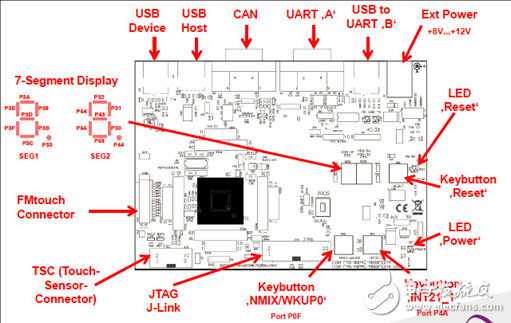
圖3.評估板SK-FM3-80PMC-MB9BF524M主要元件分布圖
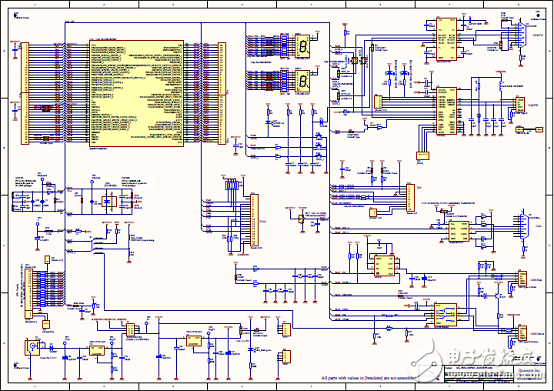
圖4.評估板SK-FM3-80PMC-MB9BF524M電路圖
 電子發燒友App
電子發燒友App










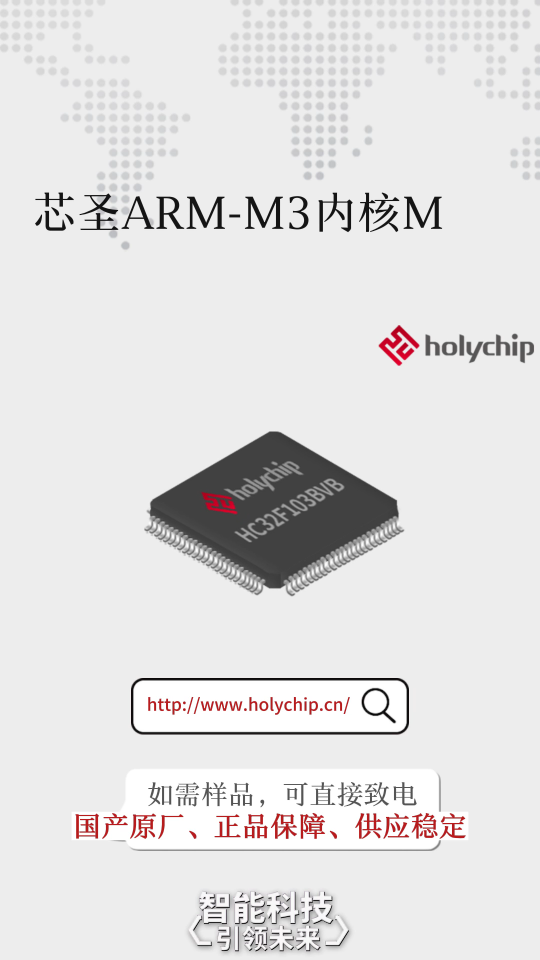
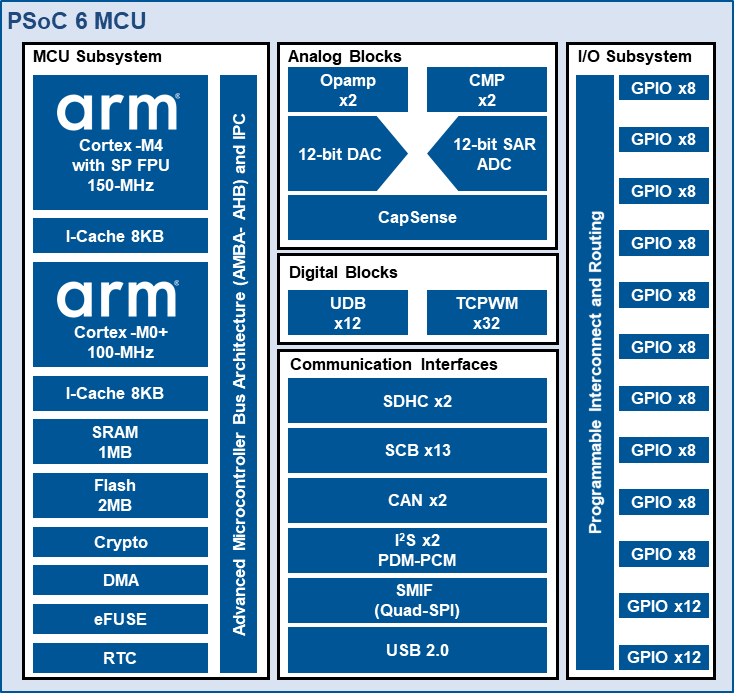










評論